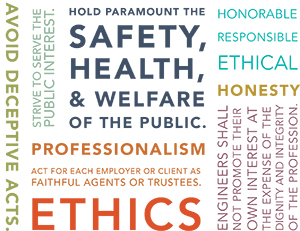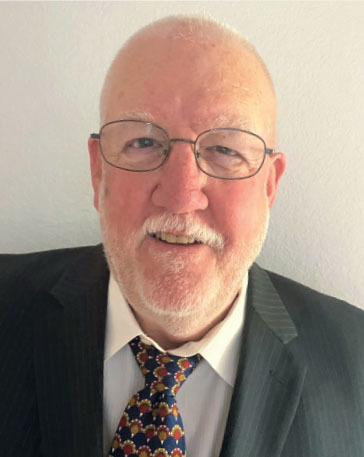January/February 2020
On Ethics
Ethics and Professionalism—Alabama Style
 For 15 years, the Alabama Society of Professional Engineers has held an annual Ethics Day to help members understand how ethics affects engineering practice and professionalism.
For 15 years, the Alabama Society of Professional Engineers has held an annual Ethics Day to help members understand how ethics affects engineering practice and professionalism.
ASPE Ethics Day takes place in November as a webinar telecast in six locations around the state corresponding to the society’s local chapters. The online event gives members and nonmembers the opportunity to network at each site (complete with a lunch) and earn up to four continuing education credits. For the last two years, ASPE has provided this seminar to members free of charge. It also serves as a recruitment tool—nonmembers can have their event fee waived if they join the society.
ASPE President Whit McCormack, P.E., has been involved with the ethics program for the past five years. The topics covered during the event never fail to fascinate him. “The biggest takeaway that I have from participating is how thin the line between ethical and unethical behavior can be and that we, as engineers, must be diligent in all of our endeavors to be ethical,” he says.
ASPE works to make each Ethics Day a success by featuring presenters who provide diverse perspectives to help participants expand on their knowledge about ethics and learn their roles as responsible engineers. This year’s speakers were featured in four locations: Birmingham, Decatur, Huntsville, and Montgomery. Harry Gong Jr., P.E., spoke about the practice of engineering ethics outside of engineering design efforts. Robert Herbert, an investigator with the Alabama Board of Licensure for Professional Engineers and Land Surveyors, shared information on ethics and state-based case studies. Davis Woodruff, P.E., delivered a presentation on building a solid foundation with core values and common-sense business principles. A. Morton Archibald, P.E., gave his presentation on the ethics of sustainable design.
In the past State Senator Clyde Chambliss, P.E., the only professional engineer in the Alabama Legislature, has presented details about the challenges of balancing an engineering business and public service. He has also encouraged his fellow PEs to consider running for elected offices.
ASPE President-Elect Shunna Cannon, P.E., believes that the most striking speakers have consistently been from the state licensing board. The disclosure of their investigations provides valuable insight on current ethics issues. “They provide updates to Alabama state law as well as lessons learned from various case studies regarding engineers with unethical behavior and work practices,” says Cannon. “Participants can directly apply and customize the principles to their discipline of work.”
The program also provides an opportunity to reinvigorate chapter activities, says Huntsville Chapter President George Hamilton, P.E., F.NSPE. This year his chapter hosted a site at the local university.
Hamilton appreciates that the event speakers offer perspectives on real scenarios on the legal consequences of unethical behavior, particularly ones that inform PEs on engineering practice specific to Alabama. He recalls a memorable presentation on a Birmingham bribery scandal involving sewer construction contracts. A professional engineer involved in the bribery scheme was convicted and served time in federal prison. The convicted PE was the speaker. “Talk about hearing it from the horse’s mouth,” says the NASA engineer. “He went to jail and his family had to go on without him and his income. Now that’s serious.”
This year’s event was attended by 120 professional engineers. The local Decatur chapter saw more attendees this year than in recent memory. ”Our event is such a hit each year. Attendees have a great opportunity for continuing education and networking with others in the engineering profession,” says Malinda Battey, ASPE executive director. “We put a lot of effort into it and are successful thanks to help from our many volunteers.”
The event takes six months of thoughtful planning and organizing, says Cannon. “Along with the assistance of our executive director, it requires good organizational skills, effective communication, and time management for facility reservations and speaker arrangements. Nonetheless, each year, the technological glitches can be anticipated, and we try to identify and resolve those issues during our test runs, which happen two to three weeks in advance.”
Cannon adds, “Although we cannot format each presentation, we expect all speakers to deliver a quality presentation with relevant and noteworthy subject matter and content.”


 Volunteering at NSPE is a great opportunity to grow your professional network and connect with other leaders in the field.
Volunteering at NSPE is a great opportunity to grow your professional network and connect with other leaders in the field. The National Society of Professional Engineers (NSPE) encourages you to explore the resources to cast your vote on election day:
The National Society of Professional Engineers (NSPE) encourages you to explore the resources to cast your vote on election day:



